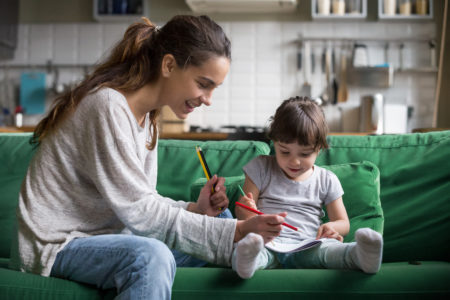Sometimes, it happens. You need someone to watch your kids but none of your regular babysitters are available. You’re desperate—you must hire a sitter you’ve never met. What do you do when you don’t know the person watching your kids?

Of course, best practice suggests that you prescreen your childcare providers, check references, and hold a pre-sitting “interview” to get to know them and their skillset. This is the best-case scenario for protecting your kids while you’re away. For more information about how to hire safe caregivers, check out this post. But what if, for whatever reason, this simply isn’t possible?
The key thing to keep in mind is the second of the 5 Steps to Protecting Children™: Minimize Opportunity. If your children have to be around an adult that you don’t know, or know well, make sure that their interactions will be public or non-isolated, interruptible, and regulated as much as possible. Above all, be clear with both the sitter and your kids what the family rules are so that everyone understands the expectations.
Preventing Isolation:
- If it’s evening time, go ahead and give your kids a bath yourself (or if your kids are older, have them take showers/baths and get ready for bed in advance). This minimizes any opportunities for the sitter to be alone with your kids while they may be undressed.
- Make a rule that doors must be open at all times; encourage activities and behaviors that include the whole group and discourage individual pursuits. Consider making certain areas of the house off-limits while you’re away, like basements or bedrooms.
Keeping Situations Interruptible:
- Make sure the sitter knows that you’ll be checking in with the kids – it may even be a good idea to circle back by the house and drop in while you’re supposed to be out. You could also ask a “safe” neighbor or family member to drop by unannounced for you.
- Confirm boundaries with your kids: revisit your body safety conversations and remind them that if anyone makes them feel uncomfortable, they can tell you. In fact, it may be helpful to establish a codeword or phrase that your child can say to alert you to their discomfort in a simple way. If they use this word, you’ll know something’s wrong.
Setting Expectations:
- Ask the sitter to come over early so you can speak to them and set expectations.
-
-
- Ask about their experience and if they’ve had any training, such as CPR or Stewards of Children®.
- Ask them how they would respond to specific scenarios with the kids.
- Make it clear that you hired them, and only them, as the babysitter. That means they shouldn’t have anyone else in the house while you’re gone. Additionally, update the babysitter on who is approved to be around your children without your presence (perhaps your family physician, a grandparent, the previously-mentioned “safe” neighbor, etc.).
- Let the sitter know that your kids know about body safety and boundaries and that you don’t keep secrets from each other. Being upfront with this information can often be a deterrent to inappropriate behavior.
-
- Confirm the rules with your kids, and make sure they know that the babysitter isn’t allowed to break them either. Empower them to call you if anything feels wrong or rules are broken. This holds both parties (the kids and the sitter) accountable.
- Check-in with your kids afterward, without the sitter present. What did they do? What was the most fun? How did they feel? What did they think of the sitter? Make sure they know they can be open and honest without any repercussions.
Think there might be other times you’d need a sitter you haven’t met before? Try playing the What If? Game with your child to explore what scenarios with the sitter might look like, and beyond. This can help your child feel confident and self-assured in lots of areas, not just with a sitter.
Follow us on social media to stay up to date and join the conversation.


Excellent advice. The babysitter must know all concerned are aware of the threats, what they look like and what to do about it.
Making the child feel empowered is life changing!
Great resources, the “What If” is a great tool
The what-if game is a valuable teahing tool!
One of the new things I’ve learned is the “What If” game. I will be sure to practice it with my nephews.
It had a few ideas I have not thought of or went over went with my children and it had some great ideas.
The what if game is a great tool I will be using this in my home
This is a great tool to use
Be involved in your child’s life
The whole “what if” game makes it a lot easier to get an answer out of a child oppose to bombarding they in depth questions.
The “What If” game I play with my daughter and it is very helpful and fun for us.
Excellent ideas for keeping the child safe in, for example, a new babysitter situation or talking about safety in a opportunity of just washing your hands. Also, do “what if ” scenerios with your child. Great ideas!
Very knowledgeable
Some very good comments on how to minimize risk.